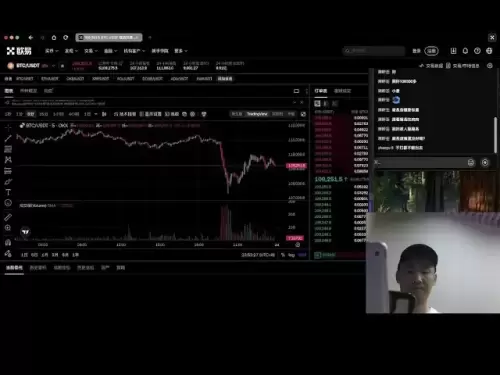-
 Bitcoin
Bitcoin $108,933.7361
-0.76% -
 Ethereum
Ethereum $2,558.6649
-0.82% -
 Tether USDt
Tether USDt $1.0002
0.00% -
 XRP
XRP $2.3544
-1.04% -
 BNB
BNB $673.9376
0.06% -
 Solana
Solana $176.7114
-3.35% -
 USDC
USDC $0.9997
-0.01% -
 Dogecoin
Dogecoin $0.2284
-3.86% -
 Cardano
Cardano $0.7612
-3.34% -
 TRON
TRON $0.2715
1.26% -
 Sui
Sui $3.6561
-1.18% -
 Hyperliquid
Hyperliquid $34.5880
-4.31% -
 Chainlink
Chainlink $15.7068
-4.40% -
 Avalanche
Avalanche $23.1823
-7.01% -
 Stellar
Stellar $0.2892
-1.89% -
 Shiba Inu
Shiba Inu $0.0...01445
-3.91% -
 Bitcoin Cash
Bitcoin Cash $428.2182
-3.16% -
 UNUS SED LEO
UNUS SED LEO $8.8139
0.45% -
 Hedera
Hedera $0.1908
-5.28% -
 Toncoin
Toncoin $3.0146
-2.01% -
 Litecoin
Litecoin $96.8695
-2.72% -
 Monero
Monero $396.9459
-0.74% -
 Polkadot
Polkadot $4.5878
-4.22% -
 Bitget Token
Bitget Token $5.6338
0.18% -
 Pepe
Pepe $0.0...01394
-7.24% -
 Pi
Pi $0.7719
0.40% -
 Dai
Dai $0.9999
0.01% -
 Ethena USDe
Ethena USDe $1.0006
0.02% -
 Aave
Aave $268.0763
3.76% -
 Uniswap
Uniswap $6.2180
-0.12%
Can ETH wallet addresses be tracked? Blockchain transparency analysis
ETH wallet addresses can be tracked using blockchain explorers and analytics tools, but privacy measures like mixers can obscure transactions, raising legal and ethical concerns.
May 14, 2025 at 11:28 am

The question of whether ETH wallet addresses can be tracked delves into the intricacies of blockchain technology and the transparency it offers. Ethereum, like other blockchain networks, is designed to be transparent, meaning that all transactions are publicly recorded on the blockchain. This transparency allows anyone to view the history of transactions associated with any given Ethereum address. However, the extent to which an address can be tracked, and the implications of this tracking, depend on various factors, which we will explore in detail.
Understanding Ethereum Blockchain Transparency
The Ethereum blockchain operates on a principle of public ledger transparency. Every transaction that occurs on the network is recorded on the blockchain, which is accessible to anyone with an internet connection. This means that if you know an Ethereum address, you can see all the transactions that have been sent to and from that address. Blockchain explorers, such as Etherscan, provide user-friendly interfaces to browse these transactions, making it easy to track the movement of ETH and other tokens on the Ethereum network.
Anonymity vs. Pseudonymity on Ethereum
While the Ethereum blockchain is transparent, the addresses themselves are pseudonymous. This means that the addresses are not directly linked to real-world identities. However, if an address is linked to a real-world identity through a transaction with a known entity, such as an exchange that requires KYC (Know Your Customer) verification, the pseudonymous nature of the address can be compromised. This linkage can potentially allow for tracking the activities of the address back to the individual.
Tools and Techniques for Tracking ETH Addresses
Several tools and techniques are available for tracking ETH wallet addresses. Blockchain analytics firms, such as Chainalysis and Elliptic, use sophisticated algorithms to analyze the flow of funds across the blockchain. These firms can identify patterns and connections that might not be immediately apparent to the casual observer. Additionally, on-chain data analysis can reveal information about the behavior of an address, such as the frequency and size of transactions, which can be used to infer more about the owner of the address.
Privacy Measures and Their Effectiveness
Given the transparency of the Ethereum blockchain, users have developed various privacy measures to protect their transactions from being easily tracked. One common method is using mixers or tumblers, which mix the funds from multiple users to obscure the trail of transactions. Another approach is using privacy-focused wallets like MetaMask with additional privacy features, which can help mask the origin of transactions. However, these measures are not foolproof, and determined trackers with advanced tools may still be able to trace the funds.
Legal and Ethical Considerations of Tracking ETH Addresses
The tracking of ETH wallet addresses raises legal and ethical questions. In some jurisdictions, tracking cryptocurrency transactions without proper authorization can be illegal. Law enforcement agencies often use blockchain analytics to track criminal activity, but they must adhere to legal standards and obtain warrants when necessary. Ethically, the use of such tracking tools can be contentious, especially when used by private entities for purposes that may infringe on individual privacy rights.
Practical Steps to Track an ETH Address
If you need to track an ETH address, here are the practical steps you can follow:
- Use a Blockchain Explorer: Visit a blockchain explorer like Etherscan. Enter the ETH address you want to track in the search bar.
- Review Transaction History: Once you have the address loaded, you can see all the transactions associated with that address. Look at the inflows and outflows of ETH and tokens.
- Analyze Transaction Patterns: Pay attention to the frequency and size of transactions. This can give you insights into the behavior of the address owner.
- Check for Linked Addresses: Sometimes, funds are moved between multiple addresses. Look for patterns that might indicate the same owner controlling multiple addresses.
- Utilize Advanced Analytics Tools: If you need more detailed analysis, consider using services like Chainalysis, which can provide deeper insights into the flow of funds.
Limitations of Tracking ETH Addresses
Despite the tools and techniques available, there are limitations to tracking ETH addresses. Transactions that use privacy-enhancing technologies, such as mixers, can be difficult to trace. Additionally, if an address has never been linked to a real-world identity, tracking it back to an individual remains challenging. The effectiveness of tracking also depends on the sophistication of the tools used and the expertise of the person conducting the tracking.
Frequently Asked Questions
Q: Can I track an ETH address without any tools?
A: While you can manually track an ETH address using a blockchain explorer, more detailed tracking requires specialized tools and expertise. Blockchain explorers provide basic transaction history, but advanced analytics tools are needed for deeper insights.
Q: Is it legal to track someone's ETH address?
A: The legality of tracking an ETH address depends on your jurisdiction and the purpose of the tracking. Law enforcement agencies may track addresses for criminal investigations, but private individuals should be cautious and ensure they are not violating privacy laws.
Q: Can I prevent my ETH address from being tracked?
A: While no method is completely foolproof, using mixers, privacy-focused wallets, and avoiding linking your address to your real-world identity can help enhance your privacy on the Ethereum network.
Q: How can blockchain analytics firms identify criminal activity?
A: Blockchain analytics firms use algorithms to identify patterns associated with criminal activity, such as frequent small transactions or transactions to known illicit addresses. They also work with law enforcement to share data and insights.
Disclaimer:info@kdj.com
The information provided is not trading advice. kdj.com does not assume any responsibility for any investments made based on the information provided in this article. Cryptocurrencies are highly volatile and it is highly recommended that you invest with caution after thorough research!
If you believe that the content used on this website infringes your copyright, please contact us immediately (info@kdj.com) and we will delete it promptly.
- Africa's tourism recovery is lagging and costing around $60 billion in revenue
- 2025-05-24 23:00:13
- Bags and rolls of circulation quality 2025 American Women, Dr. Vera Rubin quarter dollars will be offered
- 2025-05-24 23:00:13
- As BTC crosses the $100k threshold, memecoin traders are also back in business
- 2025-05-24 22:55:13
- Lamar Odom Makes a Striking Appearance at Donald Trump's Exclusive Meme-Coin Gala
- 2025-05-24 22:55:13
- The Cardano (ADA) Price Rally Required to Flip USDC Hinges on a Potential Breakout Past the Psychological Level of $1
- 2025-05-24 22:50:13
- 3 of the Best AI Agent Cryptos to Buy Now
- 2025-05-24 22:50:13
Related knowledge
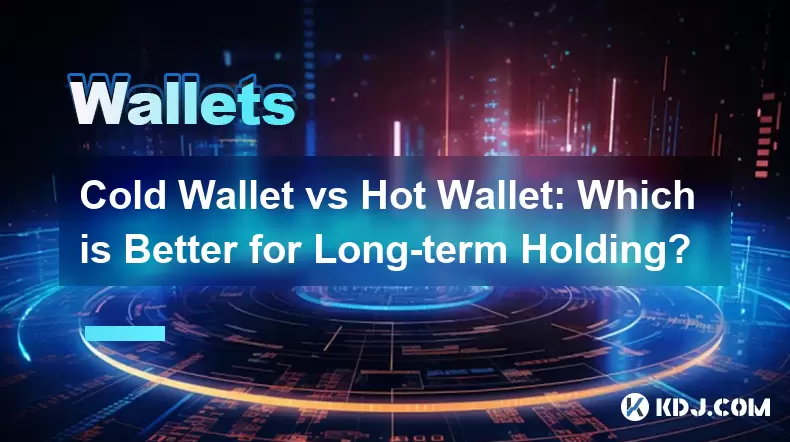
Cold Wallet vs Hot Wallet: Which is Better for Long-term Holding?
May 24,2025 at 01:35pm
When considering the best method for long-term holding of cryptocurrencies, the choice between a cold wallet and a hot wallet is critical. Cold wallets, also known as hardware wallets, store your private keys offline, making them highly secure against online threats. On the other hand, hot wallets are connected to the internet and are more convenient fo...

How to choose a cryptocurrency wallet? What should you pay attention to for safe storage?
May 24,2025 at 03:00pm
Choosing the right cryptocurrency wallet is crucial for the safety and management of your digital assets. With numerous options available, it's important to understand the different types of wallets and what to look for in terms of security and usability. This article will guide you through the process of selecting a suitable cryptocurrency wallet and p...
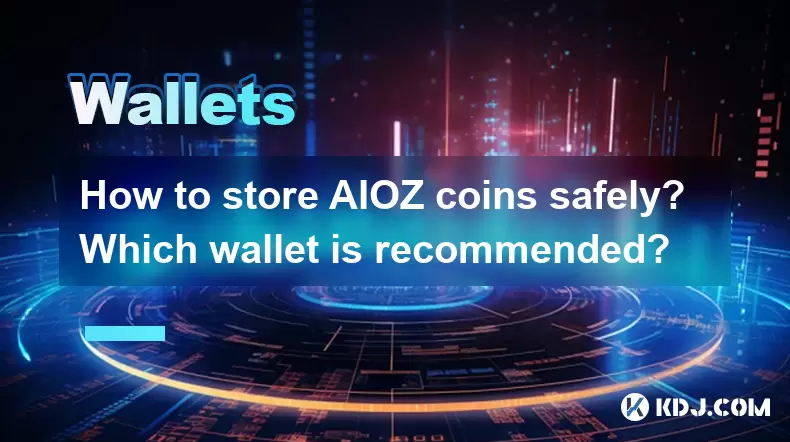
How to store AIOZ coins safely? Which wallet is recommended?
May 21,2025 at 06:42pm
Storing AIOZ coins safely is crucial for any cryptocurrency holder. AIOZ Network is a blockchain platform that combines decentralized storage, streaming, and computing services. To ensure the security of your AIOZ coins, it's essential to choose the right wallet and follow best practices for cryptocurrency storage. In this article, we will explore vario...

How to choose an EGLD wallet? Which is safer, a cold wallet or a hot wallet?
May 21,2025 at 02:42pm
Choosing the right wallet for your EGLD (Elrond) tokens is crucial for ensuring the security and ease of management of your digital assets. EGLD, the native token of the Elrond network, supports various types of wallets, each offering different levels of security and functionality. In this article, we'll explore the key factors to consider when selectin...
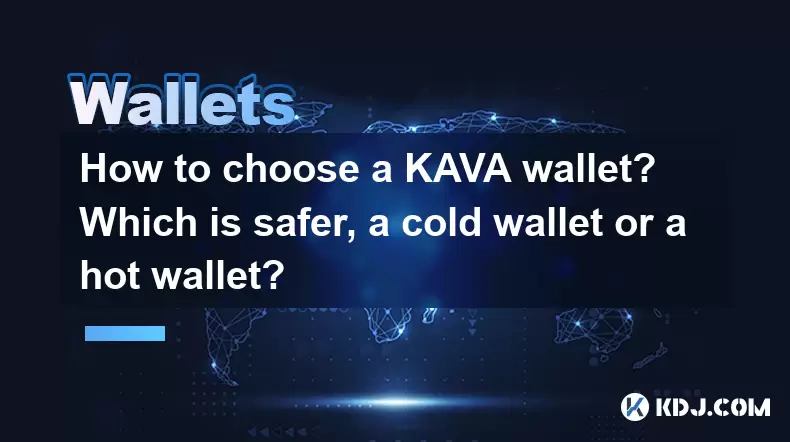
How to choose a KAVA wallet? Which is safer, a cold wallet or a hot wallet?
May 21,2025 at 08:50am
Choosing the right wallet for your KAVA tokens is crucial for the security and management of your cryptocurrency assets. KAVA, being a popular cryptocurrency, supports various types of wallets, each with its own set of features and security levels. This article will guide you through the process of selecting a KAVA wallet and explore the safety differen...
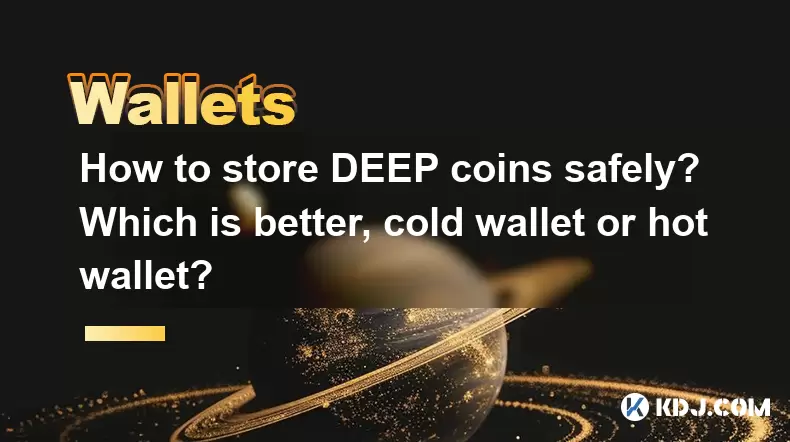
How to store DEEP coins safely? Which is better, cold wallet or hot wallet?
May 21,2025 at 01:49am
Storing DEEP coins safely is a critical concern for any cryptocurrency holder. DEEP coins, like other cryptocurrencies, are digital assets that require secure storage to protect them from theft and loss. There are two primary types of wallets for storing DEEP coins: cold wallets and hot wallets. Each has its own set of advantages and disadvantages, and ...

Cold Wallet vs Hot Wallet: Which is Better for Long-term Holding?
May 24,2025 at 01:35pm
When considering the best method for long-term holding of cryptocurrencies, the choice between a cold wallet and a hot wallet is critical. Cold wallets, also known as hardware wallets, store your private keys offline, making them highly secure against online threats. On the other hand, hot wallets are connected to the internet and are more convenient fo...

How to choose a cryptocurrency wallet? What should you pay attention to for safe storage?
May 24,2025 at 03:00pm
Choosing the right cryptocurrency wallet is crucial for the safety and management of your digital assets. With numerous options available, it's important to understand the different types of wallets and what to look for in terms of security and usability. This article will guide you through the process of selecting a suitable cryptocurrency wallet and p...

How to store AIOZ coins safely? Which wallet is recommended?
May 21,2025 at 06:42pm
Storing AIOZ coins safely is crucial for any cryptocurrency holder. AIOZ Network is a blockchain platform that combines decentralized storage, streaming, and computing services. To ensure the security of your AIOZ coins, it's essential to choose the right wallet and follow best practices for cryptocurrency storage. In this article, we will explore vario...

How to choose an EGLD wallet? Which is safer, a cold wallet or a hot wallet?
May 21,2025 at 02:42pm
Choosing the right wallet for your EGLD (Elrond) tokens is crucial for ensuring the security and ease of management of your digital assets. EGLD, the native token of the Elrond network, supports various types of wallets, each offering different levels of security and functionality. In this article, we'll explore the key factors to consider when selectin...

How to choose a KAVA wallet? Which is safer, a cold wallet or a hot wallet?
May 21,2025 at 08:50am
Choosing the right wallet for your KAVA tokens is crucial for the security and management of your cryptocurrency assets. KAVA, being a popular cryptocurrency, supports various types of wallets, each with its own set of features and security levels. This article will guide you through the process of selecting a KAVA wallet and explore the safety differen...

How to store DEEP coins safely? Which is better, cold wallet or hot wallet?
May 21,2025 at 01:49am
Storing DEEP coins safely is a critical concern for any cryptocurrency holder. DEEP coins, like other cryptocurrencies, are digital assets that require secure storage to protect them from theft and loss. There are two primary types of wallets for storing DEEP coins: cold wallets and hot wallets. Each has its own set of advantages and disadvantages, and ...
See all articles
























